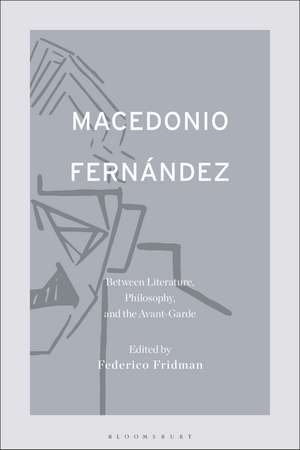Macedonio Fernández: Between Literature, Philosophy, and the Avant-Garde
Editat de Dr. Federico Fridmanen Limba Engleză Paperback – 26 iul 2023
| Toate formatele și edițiile | Preț | Express |
|---|---|---|
| Paperback (1) | 191.13 lei 6-8 săpt. | |
| Bloomsbury Publishing – 26 iul 2023 | 191.13 lei 6-8 săpt. | |
| Hardback (1) | 568.71 lei 6-8 săpt. | |
| Bloomsbury Publishing – 12 ian 2022 | 568.71 lei 6-8 săpt. |
Preț: 191.13 lei
Preț vechi: 249.26 lei
-23% Nou
Puncte Express: 287
Preț estimativ în valută:
36.58€ • 39.72$ • 30.72£
36.58€ • 39.72$ • 30.72£
Carte tipărită la comandă
Livrare economică 22 aprilie-06 mai
Preluare comenzi: 021 569.72.76
Specificații
ISBN-13: 9781501384264
ISBN-10: 1501384260
Pagini: 242
Dimensiuni: 152 x 229 x 25 mm
Greutate: 0.33 kg
Editura: Bloomsbury Publishing
Colecția Bloomsbury Academic
Locul publicării:New York, United States
ISBN-10: 1501384260
Pagini: 242
Dimensiuni: 152 x 229 x 25 mm
Greutate: 0.33 kg
Editura: Bloomsbury Publishing
Colecția Bloomsbury Academic
Locul publicării:New York, United States
Caracteristici
As the first book available in English that collects essays on Borges's mentor, each chapter provides extensive background and bibliographical references, as well as English translations of Macedonio's original texts
Notă biografică
Federico Fridman is Lecturer of Spanish at the University of Michigan, USA.
Cuprins
Acknowledgments List of AbbreviationsIntroductionFederico Fridman, University of Michigan, Ann Arbor, USAPart 1. Life and Literature at the Edge1. Jorge Luis Borges and Macedonio Fernández: History of a Literary FriendshipMónica Bueno, University of Mar del Plata, Argentina2. Heroes without Selves: Macedonio Fernández and a New Ethics of the HeroicTodd S. Garth, U.S. Naval Academy, USA3. Consuelo-Eterna, Macedonio's Erotic and Metaphysical PassionAna Camblong, University of Misiones, Argentina4. Macedonio Fernández's Neighborhood Metaphysics: Belarte, the Fool of Buenos Aires, and the Evidential SiestaGonzalo S. Aguirre, University of Buenos Aires, ArgentinaPart 2. Philosophy, Affects, and Politics5. Macedonio Fernández: The First Egocide in the Río de la PlataDiego Vecchio, University of Paris VIII, France6. A Metaphysics That Only Begins: On Macedonio's Writing PassionJulio Prieto, Universität Potsdam, Germany7. Songs Without a Self: Macedonio's Anarchist AestheticsLuis Othoniel Rosa, University of Nebraska-Lincoln, USA8. The Thought of Macedonio Fernández: A DictionaryDaniel Attala, University of Southern Brittany, FrancePart 3. Metaphysics on the Move9. Notes on Macedonio in a DiaryRicardo Piglia, Princeton University, USA10. What Is Believing?Horacio González, University of Buenos Aires, Argentina11. No hay proa sin popa Liliana Weinberg, National Autonomous University of Mexico, MexicoNotes on ContributorsBibliographyIndex
Recenzii
This volume brings together the essays of upcoming Latin Americanists and established figures of Argentine culture in order to celebrate Macedonio Fernández and reintroduce him to readers of English. It is a treat here to ponder Macedonio's radical avant-garde presence in the culture of the 1920s and 30s and to enter his world of philosophical fictions where he disrupts all realist epistemologies and shakes the bases of literary genre.
Macedonio was a great Argentinian writer whose literature/philosophy encourages others to write. This volume explores the dialogues and conversations provoked by his writing and it also places him at the crossroads of global modernity.
This carefully edited collection on Macedonio Fernández sets an impressively high standard for future studies of the legendary Argentinian. The essays are rigorous, wide-ranging, and ambitious and include a diverse range of perspectives that coincide in delivering a freshly nuanced and sophisticated assessment of the avant-garde author and his seemingly inexhaustible worlds. This is an important work of critical and visionary scholarship.
Macedonio was a great Argentinian writer whose literature/philosophy encourages others to write. This volume explores the dialogues and conversations provoked by his writing and it also places him at the crossroads of global modernity.
This carefully edited collection on Macedonio Fernández sets an impressively high standard for future studies of the legendary Argentinian. The essays are rigorous, wide-ranging, and ambitious and include a diverse range of perspectives that coincide in delivering a freshly nuanced and sophisticated assessment of the avant-garde author and his seemingly inexhaustible worlds. This is an important work of critical and visionary scholarship.
